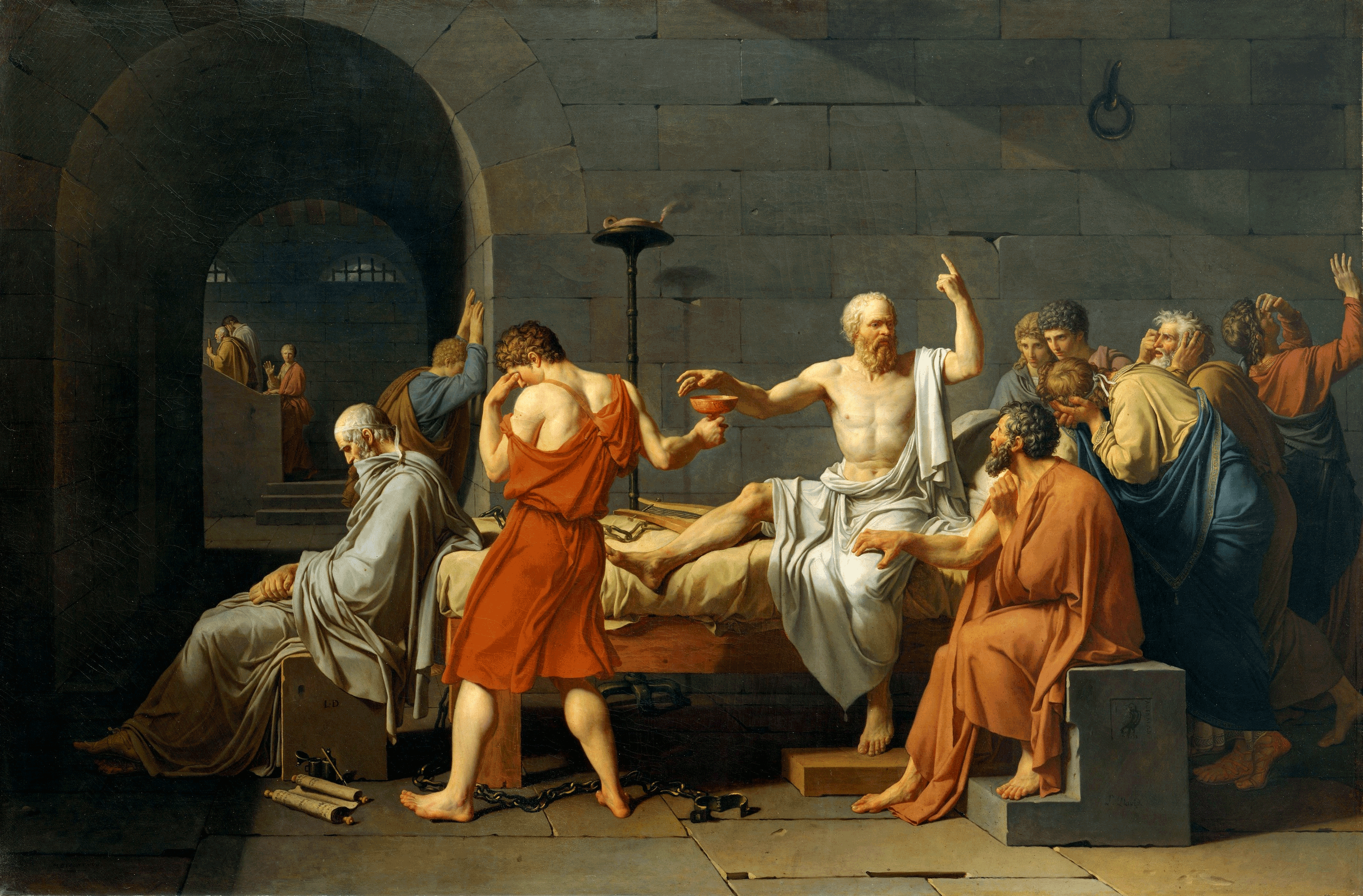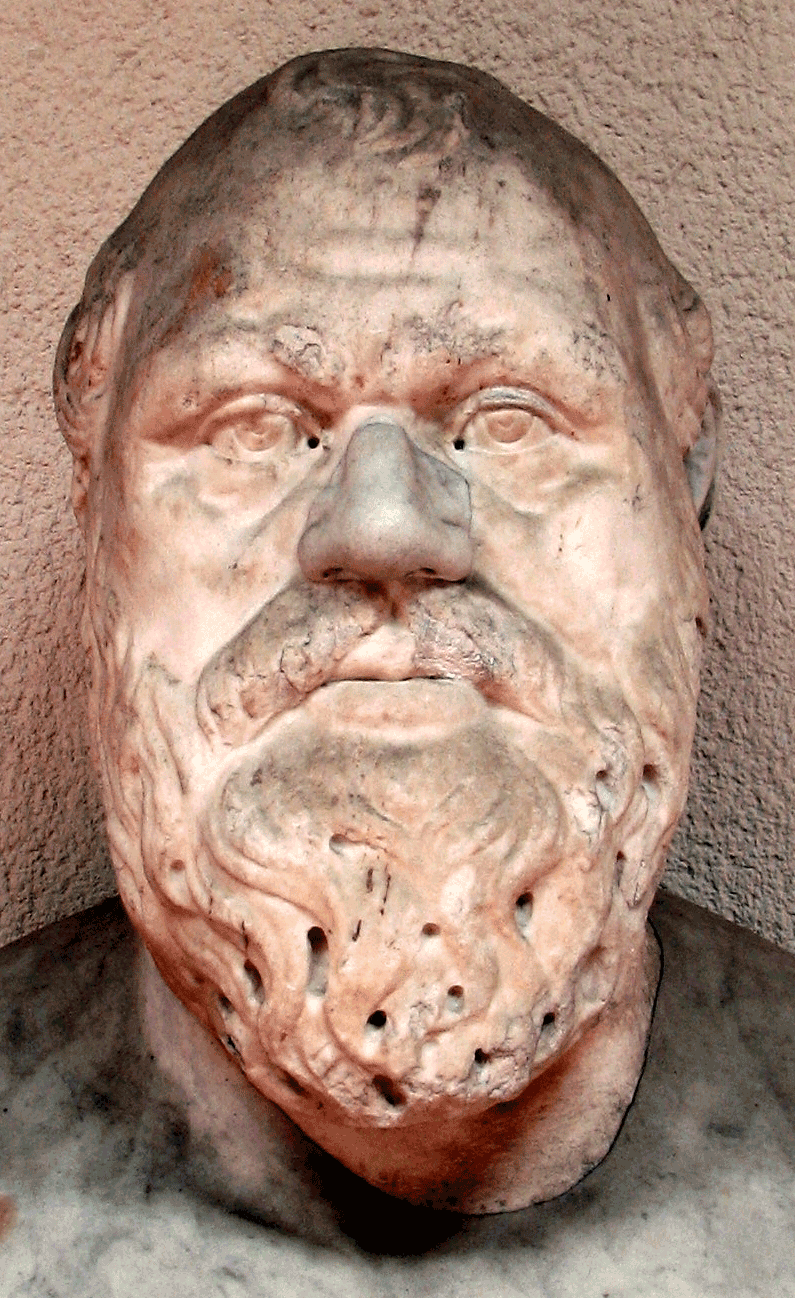

La Mort de Socrate by Jacques-Louis David (1787)
Sokrates of Alopeke




So just who was this
Sokrates guy in
Sophronikos, Son of Sokrates?
The painting above by David depicts an iconic scene of the man in prison making a point of some sort, emphatically it seems. Yet there was a real Sokrates. There isn't much to go on as to who he was. Most of us are acquainted with Sokrates by way of Plato who knew him, but we get pieces of him from two other primary sources, Xenophon and Aristophanes the comic. We have nothing from the man himself, not a word. So when one comes upon the character Sokrates in Plato's dialogues, or Xenophon's, or the playwright Aristophanes' farcical lampoons of him in his plays Clouds, Birds, and Frogs, we must proceed with caution, for this is what scholars refer to as the Sokratic Problem. We really know very little about him.
Still, we do know a few things about him. He was a hoplite, he fought battles, he was often seen in the Agora. He had three sons, Lamprocles (the eldest), Sophronikos, and Menexenos, the youngest, all of whom turned out to be "silly and dull," at least according to persnickety Aristotle in his Rhetoric. He was married. To Xanthippe. Or Myrto. And maybe one was a live-in. Or the other. Or not. We know that he was tried at the age of seventy, convicted, and executed in 399BCE by hemlock. We have no knowledge if he was cremated or buried or both, no knowledge as to where his remains were taken, or even if his remains were allowed to remain in Attica. We know that he was very influential, Plato and Xenophon and Aristophanes testify to the man's charisma and charm and irritating, often infuriating, personality. Why was he so influential? A list of recommendations below will give you a solid start in determining that for yourself.
I had originally intended Sophronikos, Son of Sokrates to be a juvenile title, a kid has the typical love-hate relationship with his father/role model/ yada yada yada. I initially got the idea when I was driving to work. I had been reading Bettany Hughes' The Hemlock Cup, and I started wondering how Sokrates' kids must have felt when he died. Times were tough back then, and the loss of the kyrios (guardian) to an oikos (household) was a major blow to a family.
Most of the books that tackle Sokrates come at him as a philosophical/historical/academic puzzle, an intellectual exercise because of the sheer influence he has had on the Western world. Humans love mysteries. That's why the mystery genre is the third largest selling genre out there. Got it. But what about the wreckage that Sokrates must have left behind, family-wise? How did the women in his family feel about his actions? How did his boys feel when he chose to abandon them when allegedly he had an opportunity to escape? He doesn't seem to be much of a family guy. We tend to brush aside such minor concerns in our pursuit of truth. But I think Dr. Emily Wilson is spot-on in her book The Death of Socrates when she candidly states, "I revere Socrates as a man who spoke truth to power...who believed in a life devoted to the search for truth" and yet mere paragraphs away states, "I find Socrates' family life--or lack of it--particularily difficult to admire. It's hard to respect a man who neglected his wife and sons in order to spend his time drinking and chatting with his friends about the definitions of common words." That was the heart of the matter for me. A man who was at once profoundly influential and admirable in so many ways; and yet...

I would recommend the following works:
-
-
-
Plato: The Last Days of Socrates. Penguin Classics
-
Xenophon: Conversations with Socrates. Penguin Classics.
-
The Hemlock Cup by Bettany Hughes
-
Socrates: A Man For Our Times by Paul Johnson
-
The Trial And Execution of Socrates: Sources and Controversies by Brickhouse & Smith
-
Why Socrates Died by Robin Waterfield
-
The Trial of Socrates by I.F. Stone
-
The Death of Socrates by Emily Wilson
"All our information about him is second-hand and most of it vigorously disputed...."
(Stanford Encyclopedia of Philosophy)
The Stanford quotation (here) by Professor Debra Nails pretty much sums up what an investigator, researcher, or scholar is going to find when he or she starts poking around: disputes, varied opinions on the man, from informed, professional inquiries to flat-out stupid and gratituous claims one can find on the Internet. Her entry makes an excellent place to begin. You can also find an interview of her here. Professor Bettany Hughes provides a video on Sokrates here.
All of the above titles and clips are well worth your time. To me the man called Sokrates is akin to a force of nature that swept over the Athenian culture. He is fascinating. As Waterfield notes in his book Why Socrates Died, Sokrates "has been through many incarnations, as successive intellectual, spiritual, and artistic movements have appropriated him." Each age tends to find in him something it can identify with.
Here are just a few of the academic disputes regarding the man:
His sexual orientation
His life's mission
His famous Sokratic paradoxes
His famous Sokratic irony
His famous daimonion (divine something) that guided him
His method of cross-examination, the Socratic Method (In addition to the sources above, I
would recommend Peter Kingsley's book, Reality.)
His ostensible indifference to joining the democratic rebels against the oligarchs Kritias and The Thirty
His views on government, on Sparta, on women
His indictment, comportment at his trial, conviction, and refusal to leave Athens
The physiological effects of the poison (hemlock) that he swallowed
And there are many, many more... The books mentioned above are a good place to begin. And you can find others about ancient Hellas and Athens here. And for fiction, try here. Enjoy.
On a lighter note regarding Sokrates of Alopeke, click here.